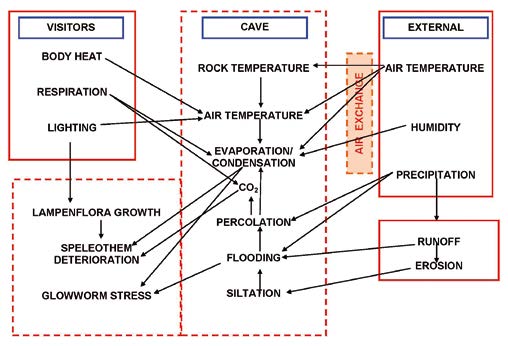The role and importance of cave microclimate in the sustainable use and management of show caves
DOI:
https://doi.org/10.3986/ac.v39i3.77Povzetek
Cave microclimate is important in the study of cave flora and fauna, certain karst processes underground and hydrogeologic aspects of speleothems; thus an understanding of microclimatic processes is especially important in the management of show caves. Here, examples are drawn from researchon New Zealand caves and examined in the context of sustainable cave use management practices. The work considers that the cave manager is concerned, firstly, withdefining the desired or optimal level or range of environmental conditions that should prevail and, secondly, withmaintaining them. To do this requires an appropriate and reliable monitoring system. It involves selecting key indicators to be monitored and setting target standards. Selection of an appropriate monitoring system, however, relies on having a good understanding of the climate processes operating, essentially how they work and how they might be appropriately managed. Unlike microclimates in the atmosphere-land boundary layer, whichare characterized by vertical exchanges, processes determining climate in all but nearly closed caves are dominated by advection of heat and moisture. It is this process that may give rise to distinct spatial and temporal patterns of climates in caves. Thermoadynamic aspects of external air-cave air interaction are assessed to explain spatial as well as short term and seasonal variations of thermal and moisture states of the cave atmosphere. The relevance of all this to cave management is discussed. It is argued that cave management is not simply a matter of determining usage levels or carrying capacity of caves; rather, it involves determining environmental management techniques that are appropriate to a particular cave condition or environmental state that should prevail.
Prenosi

Prenosi
Objavljeno
Kako citirati
Številka
Rubrike
Licenca
Avtorji jamčijo, da je delo njihova avtorska stvaritev, da v njem niso kršene avtorske pravice tretjih oseb ali kake druge pravice. V primeru zahtevkov tretjih oseb se avtorji zavezujejo, da bodo varovali interese založnika ter da bodo povrnili morebitno škodo.
Podrobneje v rubriki: Prispevki




